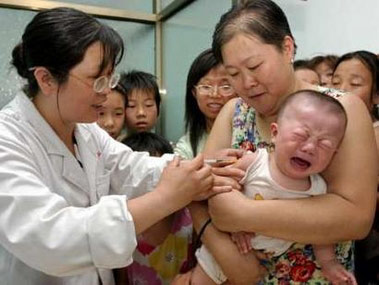Encephalitis B has killed 26 people in China so far,
as seven more were reported died from the disease in the north of the
country.

A baby cries when injected the encephalitis B
vaccine at a hospital in Yuncheng, north China's Shanxi province August
14, 2006. Encephalitis B has killed 26 people in China so far, as seven
more were reported died from the disease in the north of the
country. [Xinhua] |
The viral disease has claimed seven lives in the northwestern province of
Shaanxi, Xinhua news agency said, quoting the provincial health bureau.
A total of 186 people in Shaanxi have been infected with the
mosquito-transmitted disease since January 1, up 27.40 percent year on year,
according to the bureau.
Rural residents and children account for 82
percent of the reported cases, according to the bureau.
The provincial health bureau has warned local people to visit doctors as soon
as possible if they develop these symptoms.
The bureau also called on
local disease control centers to move quickly to eradicate mosquitoes and raise
public awareness about prevention to stop infections, especially in places where
encephalitis B cases have been reported.
Encephalitis B causes inflammation of the membranes around the brain.
The cases usually occur in July, August and September and the under-10 age group
can easily be affected, according to the Shaanxi provincial health bureau.
While few cases develop to the symptomatic stage, when inflammation of the
brain occurs, up to 60 percent of those cases result in death, while 30 percent
of survivors suffer permanent damage to their central nervous system.
According to the World Health Organization, 50,000 cases are recorded in Asia
each year, resulting in 15,000 deaths and permanent disability for many others.
The Chinese Ministry of Health urged this week that measures to prevent
and control encephalitis B be stepped up all over the country, after a recent
outbreak that killed 19 in Yuncheng City in north China's Shanxi Province.
Places where livestock are kept must undergo strict mosquito controls to
cut off infection channels. People should avoid staying overnight in the open
air in places where mosquitoes gather and take protective measures like using
window screens and mosquito repellent, according to the ministry.
People
who develop symptoms of fever, headache, vomiting and sleepiness after being
bitten by mosquitoes must go to hospital as soon as possible, said the ministry.
It said that vaccination is critical to controlling encephalitis B.
Provinces must vaccinate children and provinces where outbreaks have been
reported must carry out emergency vaccinations.
Suspected or confirmed encephalitis B cases must be reported quickly and
epidemiological research carried out in outbreak-hit areas.
Surveillance
and early warning measures for the disease must be properly carried out, it
added.
Health authorities at all levels are responsible for supervising
the control of encephalitis B and ensuring that all necessary measures are
correctly implemented, according to the ministry.
An outbreak of
encephalitis B in Yuncheng City, in Shanxi province, had infected 65 people as
of last Monday, of whom 19 have died.
Effective measures have been taken
to curb the spread of the disease since the first case was reported on July 13,
according to Shanxi health authorities.
Nine out of 13 counties of the
city, which has a population of 5 million, have reported cases of encephalitis
B, said the local disease control center.
Yuncheng, which reported about
30 cases of encephalitis B in 2005,accounts for over 50 percent of encephalitis
B cases in Shanxi Province each year.
Last month, the health ministry
received 2,314 reports of new encephalitis B cases, up 43.73 percent on the same
period last year. It also recorded 78 deaths from the disease, down 6.02 percent
year-on-year.
The ministry noted it was peak season for encephalitis B
and called for local authorities to do more to prevent its spread.
China
saw two big outbreaks of encephalitis B in the 1960s and 1970s, prompting a
nationwide vaccination campaign.
However, over the last couple of years,
encephalitis B has been on the resurge, with China reporting between 5,000 and
10,000 cases a year. Some local areas have been ravaged by severe outbreaks.